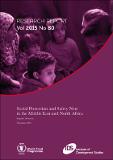| dc.contributor.author | Devereux, Stephen | |
| dc.coverage.spatial | Middle East | en |
| dc.coverage.spatial | North Africa | en |
| dc.date.accessioned | 2016-02-15T15:13:08Z | |
| dc.date.available | 2016-02-15T15:13:08Z | |
| dc.date.issued | 2016-02-15 | |
| dc.identifier.isbn | 978 1 78118 280 2 | |
| dc.identifier.uri | https://opendocs.ids.ac.uk/opendocs/handle/20.500.12413/8976 | |
| dc.description.abstract | Countries in the Middle East and North Africa (MENA) region face a number of challenges, including ongoing civil unrest with associated displacement of people and disruption of services, stagnant economic growth and high unemployment, food insecurity and rising malnutrition, exacerbated by import dependence and natural disasters. Safety nets and broader social protection instruments offer partial solutions to some of these challenges. Consumer price subsidies on food and fuel, historically favoured in this region, are expensive and regressive, and are being phased out in many countries and replaced with targeted social assistance programmes. However, their coverage is low and targeting is inaccurate – less than a quarter of benefits reach the poorest quintile – which limits their impact on poverty and food insecurity. Apart from food subsidies and cash transfers or food vouchers, school feeding and public works are also popular social protection instruments in MENA countries. School feeding programmes promote improved nutrition as well as access to education, often addressing gender inequities by targeting girls. Public works projects provide food or cash through temporary employment on infrastructure projects, such as constructing or rehabilitating rural feeder roads. The large numbers of refugees, internally displaced people (IDPs) and migrants in this region require special attention, since most have no entitlements to social protection from either their home or host countries. Informal and semi-formal social protection plays a significant role, notably through religious redistributive mechanisms such as Zakat. Despite the pervasive political instability in this region, especially since the Arab Spring, social protection systems must be established that deliver predictable and reliable social assistance to those who need it, and the ‘subsidy dividend’ should be invested in expanded, flexible and more cost-effective safety nets. Social protection can and should make a more substantial contribution to reducing poverty and achieving food and nutrition
security in all MENA countries. | en |
| dc.language.iso | en | en |
| dc.publisher | Institute of Development Studies | en |
| dc.relation.ispartofseries | IDS Research Report;80 | |
| dc.rights | This publication is copyright, but may be reproduced by any method without fee for teaching or nonprofit purposes, but not for resale. Formal permission is required for all such uses, but normally will be granted immediately. For copying in any other circumstances, or for re-use in other publications, or for translation or adaptation, prior written permission must be obtained from the publisher and a fee may be payable. | en |
| dc.rights.uri | http://www.ids.ac.uk/files/dmfile/IDSOpenDocsStandardTermsOfUse.pdf | en |
| dc.subject | Social Protection | en |
| dc.title | Social Protection and Safety Nets in the Middle East and North Africa | en |
| dc.type | IDS Research Report | en |
| dc.rights.holder | Institute of Development Studies | en |
| dc.identifier.team | Rural Futures | en |

